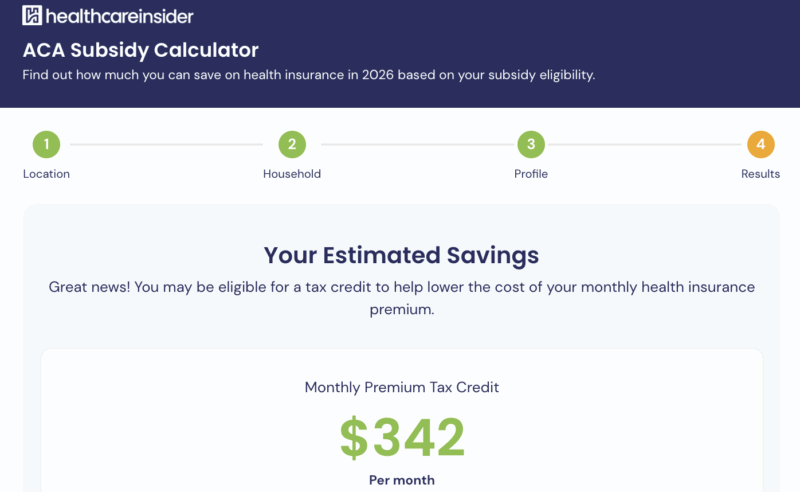Written by James Yoo
We want to help you make educated healthcare decisions. While this post may have links to lead generation forms, this won’t influence our writing. We adhere to strict editorial standards to provide the most accurate and unbiased information.
As you prepare to file income taxes, you must consider whether or not Obamacare taxes apply to you. The healthcare reform law’s shared responsibility provision and related payment was in effect throughout 2018. Premium tax credits that you receive from your health insurance may also impact your taxes.
Here’s a brief guide on how to prepare and what to keep in mind as you work toward filing your taxes this spring. From important forms (like the 1095-A tax form and the 8962 tax form) to information about premium tax credits and deductions, this guide should give any taxpayer a leg up.
Obamacare Tax Forms You May Need
There are a few Obamacare (ACA) tax forms that come into play during tax season.
These forms will not apply to all Americans. Their necessity depends on where you bought health insurance coverage (i.e., on a private website or through a government marketplace). Whether or not you received an advance premium tax credit or plan to apply for it when filing taxes, and whether you received an exemption from having coverage or plan to apply for when filing taxes are important. IRS Publication 5187 has not been updated in several years, but it remains the most recent ACA guide from the IRS as of 2019.
ACA forms include the following:
- Form 1095-A, Health Insurance Marketplace Statement — Taxpayers who purchased health insurance coverage through state exchanges and the federal marketplace fill out this form. With form 1095-A, you provide information regarding the recipient(s) of health insurance coverage in your household and policy details such as start and termination dates, as well as monthly premium amounts paid and monthly advance premium tax credits received throughout the year.
- here’s how to get a 1095 form if you haven’t received one.
- Form 8962, Premium Tax Credit — This form helps you determine your tax credit eligibility for the tax year and reconciles that amount with any advance premium tax credit (financial assistance) you received.
- Form 8965, Health Coverage Exemptions — Those who were granted an exemption from health insurance coverage through their state exchange or the federal marketplace or plan to claim a coverage exemption on their tax return must fill out this form.
“Those that have insurance coverage for the entire year need to check a box on the actual tax return form that basically says ‘we were covered all year’ and that indicates to the IRS that you do not owe the penalty,” says Lindsey Buchholz, Principal Tax Research Analyst at The Tax Institute at H&R Block.
When taxpayers fill out Form 1040, whether they purchased in the private marketplace or from a state exchange or the federal marketplace, they will see a line that says “Health care: individual responsibility (see instructions).” This line includes a box to indicate that you had full-year coverage. Further instructions are included with the form.
If you had employer-based coverage or bought ACA-compliant health insurance in the private marketplace, forms 1095-A, 8962 and 8965 will not apply to you. Form 1095-A is the only form required to prove you had health insurance coverage. 1095-B and 1095-C are different versions that you may receive instead.
“The B and the C version are what would be issued by applicable large employers—so that’s those that are required to provide coverage—government, and insurance companies, which is what most people that purchased outside the marketplace would usually use to prove their coverage, but those forms are optional this year,” Buchholz explains. “So this year, it’s essentially a self-attest requirement unless you have insurance coverage through the marketplace because then you’ll have that form 1095-A.”
Obamacare Tax Penalty for Going without Coverage
If you don’t qualify for an exemption and went without minimum essential coverage in 2018 (or exceeded the allowed gap), you may owe a fine when filing your taxes. The amount you could owe may be more than you think.
“One of the most common misconceptions that we’re seeing is that people think the penalty is just $95 because they’ve heard that figure a lot in the media, but it’s actually the greater of $95 or 1% of your adjusted gross income,” Buchholz says. “And so there may be people that have a large surprise when they go to file their taxes if they didn’t have coverage.”
The annual Obamacare tax shared responsibility payment amounts for FY2018 are the greater of:
- 1 percent of your household income that is above the tax return threshold for your filing status, such as Married Filing Jointly or single, or
- Your family’s flat dollar amount, which is $695 per adult and $347.50 per child, limited to a maximum of $2,085.
The payment is capped at the cost of the national average premium for the bronze level health plan available through your state health insurance exchange or the federal marketplace in 2018. According to the IRS, you will owe one-twelfth of the annual payment for each month you or your dependents do not have coverage and are not exempt.
The shared responsibility payment amount was eliminated by the federal government starting in 2019, but it still applies in 2018. Additionally, 3 states (DC, NJ and MA) have added a similar local tax to replace it.
Affordable healthcare advocate Minda Wilson wants consumers to know that it isn’t illegal to go without health insurance:
“You either have to have health insurance or pay the fine. So, a substitute for having health insurance is paying the fine and you are perfectly in compliance and you are not breaking the law at all.”
Wilson adds:
“The next thing you have to know is if you don’t pay the fine, the only way the IRS can go after the money is to take it from your tax refund. So they are not allowed to go after your bank account or get a judgment or any of that if you don’t pay the fine.”
Buchholz confirms the IRS’ limit on collectability, echoing that they cannot levy against your property or garnish your wages to collect the penalty however, they may offset future refunds until the amount is paid in full. She adds that payment plans may be set up with the IRS anytime you owe additional taxes and can’t pay.
Exemptions from Obamacare
In some cases, you may qualify for an exemption that will prevent you from owing the Obamacare penalty.
“There are quite a few exemptions, a lot of them related to personal, financial or medical hardships—that’s the way we’re categorizing them,” Buchholz says. “So if you fall into one of those categories, it would definitely be good to bring in something to the tax appointment or have your documents ready to support why you are eligible for that exemption and you can actually file for those exemptions.”
Premium Tax Credits
If you earned between 100 and 400 percent of the federal poverty level and purchased health insurance coverage through a state exchange or the federal marketplace, you may qualify for a premium tax credit to reduce your health insurance premiums. This subsidy may be taken in advance (advance premium tax credits) or when you file your taxes. Keep in mind that you could wind up paying some or all of these subsidy funds back if you take them in advance and fail to report changes to your income and household size.
When you file, it is important to know if you received an advance premium tax credit to ensure you file correctly. Buchholz explains that some people may enroll in insurance without realizing they have received an advance premium tax credit, since the credit is paid directly to insurance carriers who then bill consumers the remaining premium amount.
“If you are in an income range where you think it’s possible [that you received an advance premium tax credit] and you purchased insurance on your own somehow, calling the carrier would probably be the most effective way to see if you received an advance premium tax credit,” she says. “You can also call the marketplace for the state you live in, whether that be the federal or whether the state has its own marketplace, and the marketplace would be able to tell you also.”
One consumer misconception on H&R Block’s radar is that people think they can claim the premium Obamacare tax credit if they had health insurance coverage all year, regardless of where they purchased it and even if they received employer-based coverage. Only those who purchase certain types of health insurance and fall into the income-eligibility range may claim the credit.
“I would like people to know that if they are not getting subsidies, it’s often cheaper to get a private policy than to get one through the exchange, and private policies have much better coverage”, Wilson says. “Most of the people who use the exchange policies tend to be sicker, and the private policies tend to be wealthier people which tend to be healthier people.”
Other Healthcare Deductions
If you itemize your deductions instead of taking the standard deduction, you’ll probably take a look at the medical expense deduction. You may deduct the amount of your total medical expenses that exceed 7.5 percent of your adjusted gross income. Next year (FY2019), the threshold will rise to 10 percent (staying at 7.5 percent if you or your spouse is age 65 or older).
“Medical expense deductions are stuff that is used to treat, cure or mitigate some sort of condition,” Buchholz says. “That can also include things like insurance premiums and then copays for doctor’s visits, so it’s really anything really that you are paying out of pocket that’s not covered by insurance and there’s not like a specific list per se of things that are eligible and not eligible it really is fact and circumstances dependent. If a doctor prescribed it, you’re probably good.”
Self-employed individuals may also be eligible for the self-employed health insurance deduction, which the IRS calls “an adjustment to income rather than an itemized deduction for premiums you paid on a health insurance policy” and refers taxpayers to Publication 535 for eligibility information.
You may want to be aware that if you take the self-employed health insurance deduction, purchased health insurance through a state exchange or the federal marketplace, and received the premium Obamacare tax credit, you can get into what Buchholz calls a “circular calculation” because the premium tax credit is partially dependent on your adjusted gross income and your self-employed health insurance deduction can reduce your AGI. Don’t worry, though, your tax professional or software can calculate it for you.
Find Professional Help to Sort Through Obamacare Taxes
As with shopping for a health insurance plan, you are not alone when it comes to managing the financial and tax-related aspects of your coverage. There is a lot of help available. Consult a financial adviser or tax professional — be sure to find someone with ACA training who is up to date with the law.
If you file your own taxes, use tax software like H&R Block or TurboTax to help guide you through the process and help cover all your Obamacare tax bases.
Thank you for your feedback!







